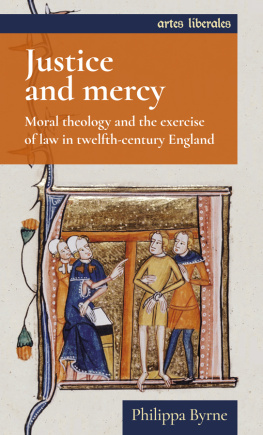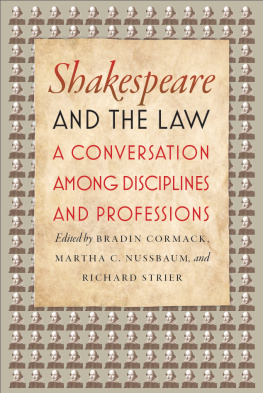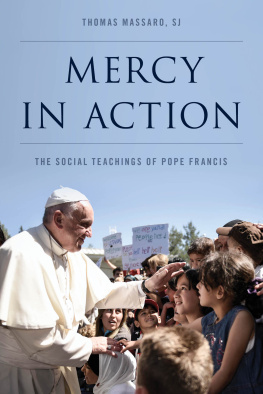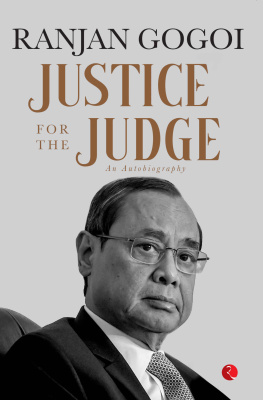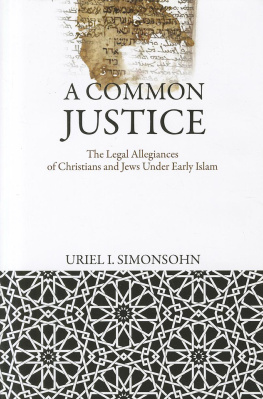Series Editors
Carrie E. Bene, T. J. H. McCarthy, Stephen Mossman and Jochen Schenk
Artes Liberales aims to promote the study of the Middle Ages broadly defined in geography and chronology from a perspective that transcends modern disciplinary divisions. It seeks to publish scholarship of the highest quality that is interdisciplinary in topic or approach, integrating elements such as history, art history, musicology, literature, religion, political thought, philosophy and science. The series particularly seeks to support research based on the study of original manuscripts and archival sources, and to provide a recognised venue for increased exposure for scholars at all career stages around the world.
Previously published
Writing the Welsh borderlands in Anglo-Saxon England
Lindy Brady
Copyright Philippa Byrne 2019
The right of Philippa Byrne to be identified as the author of this work has been asserted by her in accordance with the Copyright, Designs and Patents Act 1988.
Published by Manchester University Press
Altrincham Street, Manchester M1 7JA
www.manchesteruniversitypress.co.uk
British Library Cataloguing-in-Publication Data
A catalogue record for this book is available from the British Library
ISBN978 1 5261 2534 7hardback
First published 2019
The publisher has no responsibility for the persistence or accuracy of URLs for any external or third-party internet websites referred to in this book, and does not guarantee that any content on such websites is, or will remain, accurate or appropriate.
Forgive us our debts. Debts: and what debts are these? It would take a long time to set forth our debts, which it was easier to incur than it is to discharge, and so we are going to postpone this task to another day.
Gervase of Tilbury, Commentary on the Lords Prayer, ed. and trans. S. E. Banks and J. W. Binns, in Otia imperialia. Recreation for an Emperor (Oxford, 2002), appendix 3, 9223
This book is about debts and the paying back of dues. When it comes to the repayment of debts incurred in the writing of this book, I suspect the following may prove inadequate.
I must first thank Matthew Kempshall, who has guided this project with unstinting generosity, patience, sound counsel (and other assorted classical virtues). It was his enthusiasm which persuaded me that medieval justice was an idea worth investigating. More fundamentally, he has shown me why intellectual history is worth doing and how it should be done. Without the support and advice of Jane Garnett and George Southcombe, this would be a much weaker book (and I a much worse historian). Between them, they made the process of learning the historical discipline not just easier, but genuinely thrilling.
This book was begun at Wadham College, an institution which has been unfailingly generous with its resources intellectually, administratively and financially. It was a privilege to work in such a supportive environment, and a place which encouraged its historians to take ideas seriously. The colleges librarians (Francesca Heaney, Sandra Bailey and Tim Kirtley) were ever-cheerful in responding to my requests, and I thank them for their forbearance. The final parts were put together as a postdoctoral fellow at Somerville College a convivial and friendly place to undertake such labours.
The Arts and Humanities Research Council funded the research behind this book, and Oxfords Faculty of History provided funding for research in the Bibliothque nationale. A visiting fellowship at the Institute for St Anselm Studies in New Hampshire provided the space and time to refine some of the fuzzier parts of my theological thinking.
Colleagues and friends provided much feedback, and, like the mystical miller, helped grind coarse wheat into finer flour. Foremost among them are David DAvray and Benjamin Thompson, who gently pointed out the missing links in many arguments, and who have been characteristically generous and supportive throughout this process. The final product would hardly amount to a book at all without the ideas and questions they raised. Paul Hyams has offered many thoughtful suggestions and has always been willing to share his expertise on English law. Ingrid Rembold generously read various drafts of several meandering chapters and provided wise commentary. Corinna Matlis has trekked to many seminars and conferences, critiqued many papers and endured many complaints.
Most of all, debts are owed to my family. To Gina Byrne, for preventing me from lapsing into the pomposity that historians are prone to. To Sheila Grey, Edward Byrne and Paula Byrne, for their patience, understanding and unceasing support. A couple of sentences on an acknowledgments page is hardly sufficient repayment for their indulgence. This is a little for a lot. Like Gervase of Tilbury, I can only hope they will indulgently postpone the full reckoning of my accumulated debts until another day.

